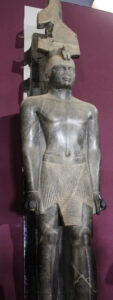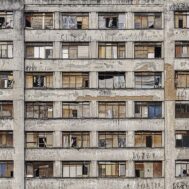
Statue of Pharaoh Taharqo in National Museum of Sudan, photo Clemens Schmillen, 1 January 2017, CCA-SA 4.0 International license.
World News Bite – SUDAN
Fighters from Sudan’s Rapid Support Forces (RSF) have allegedly looted the National Museum of Sudan in Khartoum and smuggled truckloads of artifacts across the country’s southern border. The RSF is made up of Janjaweed militias that once acted for the Sudanese government but are now supported by a U.S. ally, the United Arab Emirates. The RSF has been engaged in an ongoing conflict with the Sudanese Armed Forces (SAF) since April of last year. The RSF’s militia-based organization is accused of horrific crimes against humanity amounting to a genocide against civilian members of rival ethnic communities. In the midst of this turmoil, significant cultural losses have been reported.
In early September, Sudan’s national broadcaster, SBC, disclosed that a “large-scale looting and smuggling operation” targeted the National Museum of Sudan, one of the country’s most significant cultural institutions. This incident is just one of several serious blows to Sudan’s cultural heritage, which has suffered serious losses in the ongoing conflict. According to the SBC, satellite images show trucks loaded with items leaving the museum, heading toward the border with South Sudan. The broadcaster cited “informed sources,” alleging that some museum artifacts have been put up for sale on online platforms and social media, though it is not clear whether any transactions have taken place.
The National Museum of Sudan is one of the oldest and largest museums in the country, with a collection of archaeological artifacts spanning Sudanese history from the Stone Age through the Islamic period. Its looting represents a significant cultural and historical loss for Sudan. In July, the nonprofit Heritage for Peace stated that numerous cultural archives and thousands of valuable books have been lost, including those maintained by the Mohamed Omer Bashir Centre for Sudanese Studies at Omdurman Ahlia University and the Abdul Karim Mirghani Center, which was in the process of digitizing its material history of local labor movements. The Performing Arts Theatre in el Geneina was also burned down, and both the Sultan Bahruddin Museum and the National History Museum in Khartoum reported the loss of their collections to bombing.

Chalice of Sedeinga, National Museum of Sudan, Khartoum, 20 December 2019, Photo Sue Fleckney, CCA-SA 2.0 Generic license.
RSF fighters have also reportedly broken into the M Bolheim Bioarchaeology Laboratory in Khartoum last year. The laboratory houses human remains, including bones and skeletons believed to date back to 3300–3000 BCE. Staff from cultural institutions have fled, leaving archives and artifacts unprotected.
This is not the first time the RSF has faced accusations of looting the National Museum. In April 2023, at the start of the war, the paramilitary group was accused of plundering the museum but denied the allegations, insisting that they were fulfilling their duty to protect the building and its contents.
The losses of heritage are serious but there is hope that documented collections may eventually be recovered, but the human losses and suffering of millions has reached levels approaching genocide. Credible reports now state that mass murders, rapes, deliberate starvation and extreme ethnic violence by RSF forces have displaced some 8 million internally and 2 million more have crossed Sudan’s borders seeking refuge.
 Meroe at sun rise, Sudan, photo by Valerian Guillot, 1 February 2016, CCA 2.0 license.
Meroe at sun rise, Sudan, photo by Valerian Guillot, 1 February 2016, CCA 2.0 license. 

